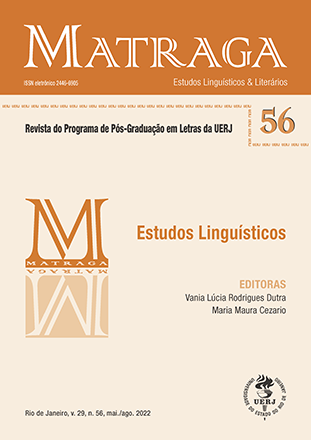Gradiência e mudança linguística: o caso de “entretanto”
DOI:
https://doi.org/10.12957/matraga.2022.65598Palavras-chave:
funcionalismo, modelos baseados no usoResumo
A categorização dos diferentes tipos de unidades linguísticas em classes estanques constitui um problema central para qualquer modelo linguístico. No entanto, ganham relevo e tem despertado a atenção de estudiosos que defendem a inexistência de fronteiras entre sistema e uso. Na perspectiva dos Modelos Baseados no Uso, gradiência é concebida como uma característica inerente aos sistemas linguísticos e uma decorrência natural da gradualidade da mudança linguística. Neste artigo, retomamos essa questão com base em uma análise diacrônica do desenvolvimento de entretanto como elemento de conexão de unidades discursivas a partir de seus usos adverbiais. Através do levantamento de dados em textos dos períodos arcaico, clássico e moderno/contemporâneo do português, mostramos que a construção temporal entretanto incorporou propriedades dos elementos juntivos e estendeu-se para o domínio do contraste. Segundo as evidências atestadas, esse processo pode ter sido impulsionado pelo fato de que a construção adverbial e a construção juntiva partilham diversas propriedades morfossintáticas e contextuais. Destaca-se a importância da posição de entretanto na periferia esquerda da oração, sua coocorrência com outros elementos de ligação, o tipo de estado de coisas codificado na oração, assim como suas propriedades aspectuais e de modo. Essa convergência conduz a uma gradação de usos que se situam num continuum entre advérbio e conector.
Downloads
Downloads
Publicado
Como Citar
Edição
Seção
Licença
AUTORIZAÇÃO
A Matraga – Revista do Programa de Pós-Graduação em Letras da UERJ está autorizada a publicar o artigo ora submetido, caso seja aceito para publicação online. Fica atestado que a contribuição é original, que não está sendo submetida a outro editor para publicação, e que a presente declaração é a expressão da verdade.
Os trabalhos publicados no espaço virtual da Matraga – Revista do Programa de Pós-Graduação em Letras da UERJ serão automaticamente cedidos, ficando os seus direitos autorais reservados à Matraga. Sua reprodução, total ou parcial, é condicionada à citação dos autores e dos dados da publicação.

A Matraga utiliza uma Licença Creative Commons - Atribuição-NãoComercial 4.0 Internacional.





